イベント&アクティビティ
Book chapter by Harald Kümmerle on mathematical knowledge production
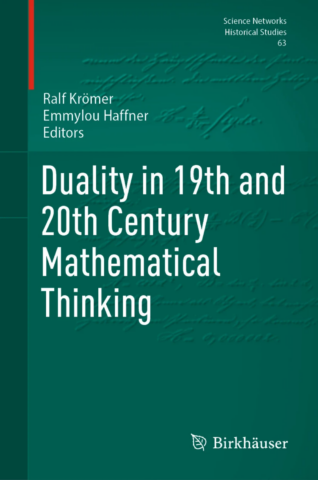 A new book chapter by DIJ researcher Harald Kümmerle analyzes the structure, reception, and production of mathematical knowledge in the early 1930s. Based on a case study of the history of a paper on duality written by the Japanese mathematician Tannaka Tadao in 1938, the chapter provides insights into the development of Tannaka’s research and into processes of cooperative knowledge production, including influences from and exchanges with mathematical communities in Japan and abroad. “Tannaka Tadao‘s 1938 paper on the duality of noncommutative topological groups and its historical background” is published in Duality in 19th and 20th Century Mathematical Thinking (Science Networks. Historical Studies series, vol 63. Cham: Birkhäuser 2024), edited by Ralf Krömer and Emmylou Haffner.
A new book chapter by DIJ researcher Harald Kümmerle analyzes the structure, reception, and production of mathematical knowledge in the early 1930s. Based on a case study of the history of a paper on duality written by the Japanese mathematician Tannaka Tadao in 1938, the chapter provides insights into the development of Tannaka’s research and into processes of cooperative knowledge production, including influences from and exchanges with mathematical communities in Japan and abroad. “Tannaka Tadao‘s 1938 paper on the duality of noncommutative topological groups and its historical background” is published in Duality in 19th and 20th Century Mathematical Thinking (Science Networks. Historical Studies series, vol 63. Cham: Birkhäuser 2024), edited by Ralf Krömer and Emmylou Haffner.
Japan-Heft von Forschung & Lehre mit Beitrag von Franz Waldenberger zu Wirtschaft und Demografie
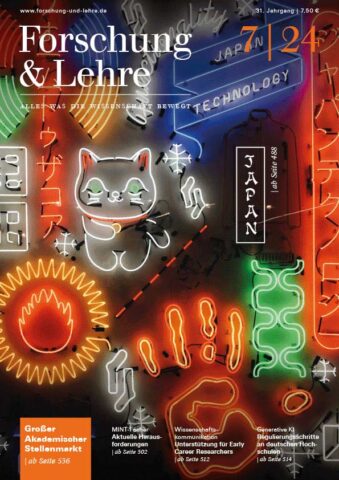 Japan gehört zu den reichsten Ländern der Welt. Gleichzeitig hat das Land den mit Abstand am höchsten verschuldeten Staatssektor. Welche Entwicklungen zeichnen sich – auch vor dem Hintergrund der demografischen Herausforderung – für Japans Wirtschaft und die Staatsfinanzen ab? In seinem Gastbeitrag “Reiches Land – armer Staat: Japans Wirtschaft im Griff der Demografie” erklärt DIJ-Direktor Franz Waldenberger u.a. wie Japans niedrige Arbeitsproduktivität, Alterung, Bevölkerungsrückgang und Japans Geldpolitik zusammenhängen. Angesichts sehr gut ausgebildeter und leistungswilliger Arbeitskräfte sowie einer exzellenten Forschungs- und Entwicklungslandschaft sieht Waldenberger gute Voraussetzungen, die aktuellen Herausforderungen zu meistern. Ebenfalls im Japan-Heft: DIJ-Alumna und ehemalige Beiratsvorsitzende Verena Blechinger-Talcott mit einem Beitrag zum Wandel in Japans Außen- und Sicherheitspolitik sowie der stellvertretende Beiratsvorsitzende David Chiavacci mit einem Artikel zur Arbeitsimmigration und dem Sozialvertrag in Japan. Die gesamte Ausgabe ist hier erhältlich.
Japan gehört zu den reichsten Ländern der Welt. Gleichzeitig hat das Land den mit Abstand am höchsten verschuldeten Staatssektor. Welche Entwicklungen zeichnen sich – auch vor dem Hintergrund der demografischen Herausforderung – für Japans Wirtschaft und die Staatsfinanzen ab? In seinem Gastbeitrag “Reiches Land – armer Staat: Japans Wirtschaft im Griff der Demografie” erklärt DIJ-Direktor Franz Waldenberger u.a. wie Japans niedrige Arbeitsproduktivität, Alterung, Bevölkerungsrückgang und Japans Geldpolitik zusammenhängen. Angesichts sehr gut ausgebildeter und leistungswilliger Arbeitskräfte sowie einer exzellenten Forschungs- und Entwicklungslandschaft sieht Waldenberger gute Voraussetzungen, die aktuellen Herausforderungen zu meistern. Ebenfalls im Japan-Heft: DIJ-Alumna und ehemalige Beiratsvorsitzende Verena Blechinger-Talcott mit einem Beitrag zum Wandel in Japans Außen- und Sicherheitspolitik sowie der stellvertretende Beiratsvorsitzende David Chiavacci mit einem Artikel zur Arbeitsimmigration und dem Sozialvertrag in Japan. Die gesamte Ausgabe ist hier erhältlich.
Open access article by Dolf Neuhaus on Japanese-Korean Protestant encounters
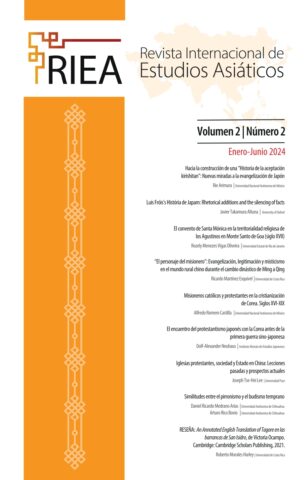 A new, open access article by DIJ historian Dolf-Alexander Neuhaus analyzes the early interactions between Japanese and Korean Protestants who came to Tokyo to study between 1880 and 1895. The article argues that this encounter played a crucial role in generating enthusiasm among Japanese Protestants to disseminate their religious teachings in Korea through evangelization. Divided into three parts, the article first contextualizes the rise of Protestantism in relation to the evolving bilateral relationship between Japan and Korea; second, it delves into the interactions between Korean students and Japanese Protestants in the early 1880s; and third, it examines the emerging debate among Japanese Protestants regarding the potential for missionary activities in Korea. The article “El encuentro del protestantismo japonés con la Corea antes de la primera guerra sino-japonesa” (The encounter of Japanese Protestantism with Korea before the first Sino-Japanese War) is published in Spanish in the Revista Internacional de Estudios Asiáticos (vol. 3, no. 1) and can be downloaded here
A new, open access article by DIJ historian Dolf-Alexander Neuhaus analyzes the early interactions between Japanese and Korean Protestants who came to Tokyo to study between 1880 and 1895. The article argues that this encounter played a crucial role in generating enthusiasm among Japanese Protestants to disseminate their religious teachings in Korea through evangelization. Divided into three parts, the article first contextualizes the rise of Protestantism in relation to the evolving bilateral relationship between Japan and Korea; second, it delves into the interactions between Korean students and Japanese Protestants in the early 1880s; and third, it examines the emerging debate among Japanese Protestants regarding the potential for missionary activities in Korea. The article “El encuentro del protestantismo japonés con la Corea antes de la primera guerra sino-japonesa” (The encounter of Japanese Protestantism with Korea before the first Sino-Japanese War) is published in Spanish in the Revista Internacional de Estudios Asiáticos (vol. 3, no. 1) and can be downloaded here
New book chapter by David M. Malitz on Thailand-Japan Relations
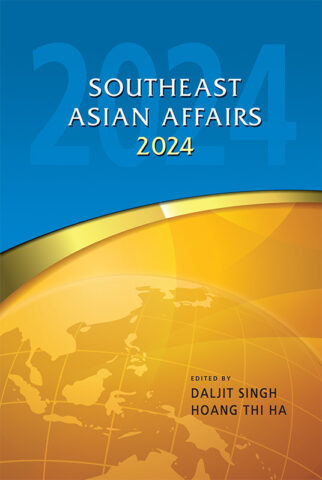 The book chapter “Beyond the Comprehensive Strategic Partnership: Taking Stock of Thailand-Japan Relations” by DIJ researcher David M. Malitz provides an overview of the development of Japanese-Thai relations leading to the Comprehensive Strategic Partnership in November 2022. David explains that due to demographic and technological change as well as the necessary transition to more sustainable economic development, the partnership’s economic backbone is faced with challenges. Nevertheless, and despite the growing influence of the People’s Republic of China, it is far too early to consider the Japanese-Thai economic partnership in terminal decline. Due to its importance for both sides, both governments have already declared their commitment to support it and make it fit for the future. Japan’s considerable soft power will be a major asset for this endeavour, the chapter concludes. David’s chapter is published in Southeast Asian Affairs 2024 (ISEAS – Yusof Ishak Institute), edited by Daljit Singh and Hoang Thi Ha.
The book chapter “Beyond the Comprehensive Strategic Partnership: Taking Stock of Thailand-Japan Relations” by DIJ researcher David M. Malitz provides an overview of the development of Japanese-Thai relations leading to the Comprehensive Strategic Partnership in November 2022. David explains that due to demographic and technological change as well as the necessary transition to more sustainable economic development, the partnership’s economic backbone is faced with challenges. Nevertheless, and despite the growing influence of the People’s Republic of China, it is far too early to consider the Japanese-Thai economic partnership in terminal decline. Due to its importance for both sides, both governments have already declared their commitment to support it and make it fit for the future. Japan’s considerable soft power will be a major asset for this endeavour, the chapter concludes. David’s chapter is published in Southeast Asian Affairs 2024 (ISEAS – Yusof Ishak Institute), edited by Daljit Singh and Hoang Thi Ha.
New open access article co-authored by Celia Spoden on avatar robots in schools
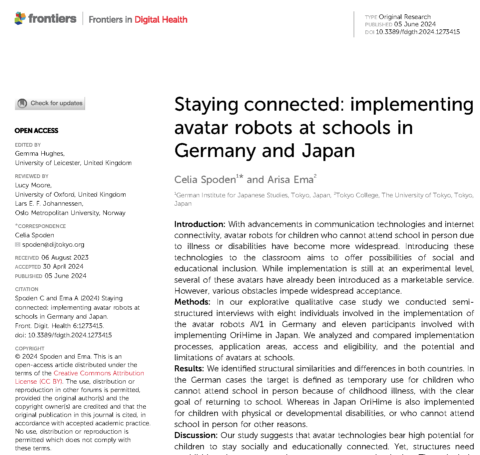 With advancements in communication technologies and internet connectivity, avatar robots for children who cannot attend school in person due to illness or disabilities have become more widespread. Introducing these technologies to the classroom aims to offer possibilities of social and educational inclusion. While implementation is still at an experimental level, several of these avatars have already been introduced as a marketable service. However, various obstacles impede widespread acceptance. In the open access research article “Staying connected: implementing avatar robots at schools in Germany and Japan”, DIJ’s Celia Spoden and Arisa Ema (University of Tokyo) identify structural similarities and differences in both countries. Their study, published in Frontiers in Digital Health, suggests that avatar technologies bear high potential for children to stay socially and educationally connected.
With advancements in communication technologies and internet connectivity, avatar robots for children who cannot attend school in person due to illness or disabilities have become more widespread. Introducing these technologies to the classroom aims to offer possibilities of social and educational inclusion. While implementation is still at an experimental level, several of these avatars have already been introduced as a marketable service. However, various obstacles impede widespread acceptance. In the open access research article “Staying connected: implementing avatar robots at schools in Germany and Japan”, DIJ’s Celia Spoden and Arisa Ema (University of Tokyo) identify structural similarities and differences in both countries. Their study, published in Frontiers in Digital Health, suggests that avatar technologies bear high potential for children to stay socially and educationally connected.
Open access article on Japan as model in Thai conservative writings
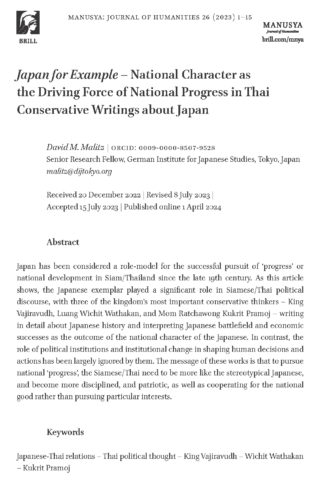 Japan has been considered a role-model for the successful pursuit of ‘progress’ or national development in Siam/Thailand since the late 19th century. As Senior Research Fellow David M. Malitz shows, the Japanese exemplar played a significant role in Siamese/Thai political discourse, with three of the kingdom’s most important conservative thinkers writing in detail about Japanese history. They interpret Japanese battlefield and economic successes as the outcome of the national character of the Japanese. The message of these works is that to pursue national ‘progress’, the Siamese/Thai need to be more like the stereotypical Japanese, and become more disciplined, and patriotic, as well as cooperating for the national good rather than pursuing particular interests. “Japan for Example – National Character as the Driving Force of National Progress in Thai Conservative Writings about Japan” (Manusya: Journal of Humanities, 26(1), 1-15) is available open access here
Japan has been considered a role-model for the successful pursuit of ‘progress’ or national development in Siam/Thailand since the late 19th century. As Senior Research Fellow David M. Malitz shows, the Japanese exemplar played a significant role in Siamese/Thai political discourse, with three of the kingdom’s most important conservative thinkers writing in detail about Japanese history. They interpret Japanese battlefield and economic successes as the outcome of the national character of the Japanese. The message of these works is that to pursue national ‘progress’, the Siamese/Thai need to be more like the stereotypical Japanese, and become more disciplined, and patriotic, as well as cooperating for the national good rather than pursuing particular interests. “Japan for Example – National Character as the Driving Force of National Progress in Thai Conservative Writings about Japan” (Manusya: Journal of Humanities, 26(1), 1-15) is available open access here
New open access paper on social care in rural Japan
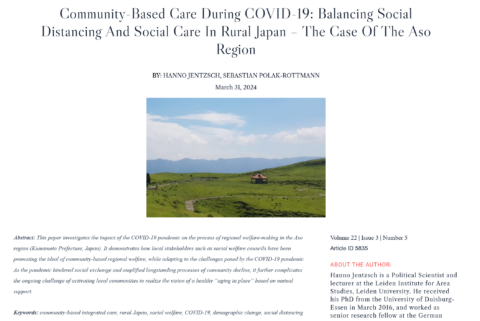
How can local stakeholders activate the local community to prevent regional care systems from collapsing? Through the lens of challenges posed by the COVID-19 pandemic, this study by DIJ political scientist Sebastian Polak-Rottmann and DIJ alumnus Hanno Jentzsch (Leiden University) reveals the strengths and weaknesses of community-based regional welfare-making in Aso (Kumamoto Prefecture). Their data demonstrates that in the Aso region longstanding social ties, trust, and mutual support constitute the normative underpinning and the concrete social foundation for preventive old age care, based on routine cooperation between communities, volunteers, and social welfare councils. However, as the pandemic hindered social exchange and amplified processes of community decline, it further challenges local communities to realize the vision of a healthy “aging in place” based on mutual support. The paper “Community-Based Care During COVID-19: Balancing Social Distancing and Social Care in Rural Japan – The Case of the Aso Region” (Asia-Pacific Journal. Japan Focus, March 2024) is available open access here.
Journal article by Nicole M. Mueller examines historical change in Japanese translation strategies
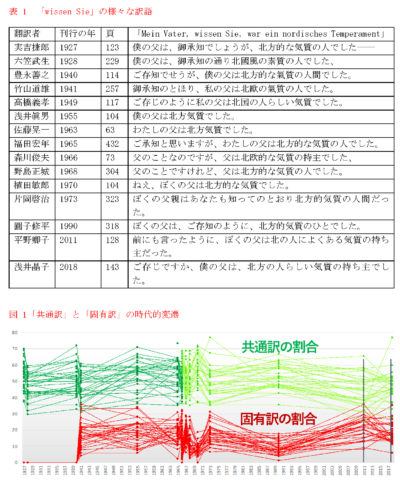
What happens if the same literary source text is translated again and again into the same target language? In her PhD research, Nicole M. Mueller set out to answer this question by conducting a digitally augmented analysis of the 15 Japanese (re)translations of Thomas Mann’s novel Tonio Kröger – a seminal text for the elitist kyōyōshugi movement that had a lasting influence on Japanese humanities and on scholarly translation culture. By implementing digital Topic Modeling as a means of operationalizing similarity scores between literary (re)translations, Nicole retraces previously hidden patterns of influence and similarity between different takes on the same source text. This reveals connections between varying historical factors and translation priorities such as faithfulness towards the source text or a natural expression in the Japanese target language. The article (in Japanese) summarizes key findings from Nicole’s PhD project and is published open access in Keiō University’s bulletin Nihongo to Nihongo kyōiku.

















 Open Access
Open Access
